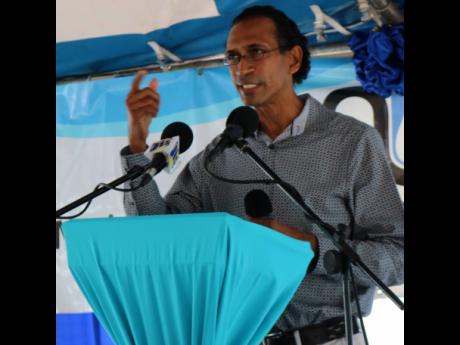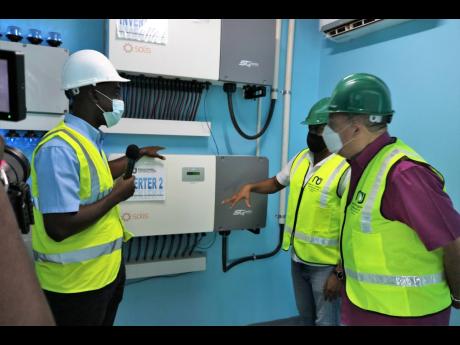Big moves in Little Park
NIC solar pumps provide super savings on irrigation cost
Some 390 farmers in Little Park, St Elizabeth, are now benefiting from a reduction in the cost of irrigation water, thanks to an upgrade to the National Irrigation Commission’s (NIC) pump station in the area.
The station has been retrofitted with a photovoltaic system comprising 600 solar panels, with two 100-kilowatt inverters. This 200-kilowatt solar system will generate 37 per cent of the plant’s energy, resulting in annual savings of at least $9 million, or about 20 per cent of its previous energy bill.
There are also plans in the pipeline to ramp up the capacity to 350 kilowatts.
During Thursday’s official commissioning ceremony, NIC acting CEO Milton Henry disclosed that the facility, which has a lifespan of 25 years, is designed to withstand Category Four hurricanes and is in keeping with its carefully crafted strategic initiative aimed at reducing its water cost to farmers.
Little Park is the third NIC pump to be outfitted with solar panels in an ongoing effort by the agency to utilise renewable energy in providing affordable water to farmers. The others are the Bengal station in Trelawny and the Ebony Park facility in Clarendon.
The Little Park facility is located on one and a half acres of land, with 400 metres of perimeter fencing, an inverter room and closed-circuit television also forming part of the project.
NIC Chairman Nigel Myrie disclosed that the project was started on February 15 and completed on September 9 at a cost of $523.14 million, with $40. 37 spent on the solar component and the balance going towards land acquisition and the other subprojects.
Fifteen members of the community were employed during the installation phase of the project.
Myrie said that logistical issues, coupled with price increases associated with COVID-19 shocks, pushed back the completion time by six weeks and also increase costs by $3.9 million.
According to Myrie, the Little Park Project puts the NIC on target to achieve a four per cent energy generation from renewable energy by March 2022 and fits into its corporate plan to develop a Renewable Energy Utilisation Programme.
“The future of irrigation practices must move beyond way beyond the usual practices of productivity gains and must also focus on facilitating rural prosperity, inclusive, equitable and greener growth,” Myrie challenged South West St Elizabeth Member of Parliament Floyd Green, a former agriculture minister.
“We want climate-resilient farms, supported by efficiently produced irrigation water to produce the best quality food so we can grow our way out of poverty, have food security and secure our prosperity,” Myrie added.
His urged the community of Little Park to deepen their investment in the project.
‘I want to urge community members to protect the infrastructure. This is your tax money at work. Do not let thieves and others who set out to destroy communities and livelihoods interfere with our irrigation infrastructure. Let us protect it and let us all enjoy the benefits that it will bring to the hard-working farmers of this community,” he said.



